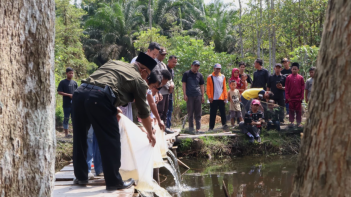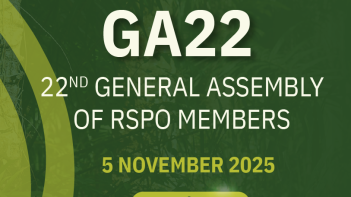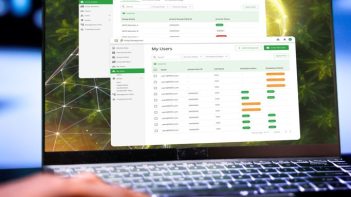There is no doubt the COVID-19 pandemic has affected many people but small-scale farmers and rural villagers, in particular, have felt the impact on their livelihoods. In Central Kalimantan, however, a group of RSPO certified independent smallholders have been using the premiums they received from selling RSPO Credits to provide basic food items such as rice and free agricultural inputs, including fertiliser, to the surrounding communities.
“We felt the joy in sharing the benefits from the sale of sustainable palm oil credits; not just with the farmers who are directly involved in certification activities, but also with the villagers affected by the COVID-19 pandemic” said Sutiyana, Group Manager of KUD Tani Subur cooperative in Central Kalimantan, Indonesia.
RSPO certification and its credit scheme has helped improve smallholder incomes in this region for some time now. The Amanah Association in Riau was the first smallholder group to become RSPO certified back in December 2012. The smallholder association currently has 501 members with a combined area of 1,048 hectares. They began selling RSPO independent smallholder credits in 2013 through GreenPalm, a platform that did not inform them of who the buyers of their credits were, and no longer exists, as it has been replaced by RSPO’s PalmTrace. Since joining the PalmTrace platform in 2017 however, the smallholders learnt they were selling their credits to Unilever, one of the largest consumer goods companies in the world.
“We buy independent smallholder credits to support and encourage smallholder farmers to conduct sustainable practices and to directly improve their livelihoods,” explained Rauf Prasodjo, Unilever’s Sustainable Sourcing Manager.
“Purchases and investments in RSPO Credits such as these are a ‘strong signal’ from buyers like ourselves. They are important for smallholder empowerment and inclusion, and support the production of sustainable palm oil,” Rauf added.
Unilever has been purchasing RSPO independent smallholder credits since 2013 and purchased approximately 40,000 tonnes of smallholder credits from 30 independent smallholder groups in 2019 alone, representing more than 6,900 independent smallholders in Indonesia, Malaysia, and Thailand, according to Unilever’s website.
The Indonesia Sustainable Oil Palm Farmers Forum (Fortasbi), who help market smallholder credits produced by its members, said they have seen an increase in the uptake of independent smallholder credits from buyers in the past several years. ACT, Bayer AG, Bali Shop, Bio Gaia AB, The Body Shop, Estée Lauder, Felleskjopet Agri SA, The Hershey Company, Johnson & Johnson, PepsiCo, and the Rewe Group have all been purchasing smallholder credits.
Furthermore, sales of RSPO independent smallholder credits through Fortasbi achieved a new record this year at USD1.16 million in the first quarter of 2020, a 47% increase compared to the total sales in 2019. The number of smallholder groups selling RSPO Credits during the first quarter of 2020 also rose from 15 to 26 groups, since last year.
“Smallholders who have sold RSPO Credits tell others in the neighbouring villages and urge them to get certified,” said Fortasbi Senior Advisor Rukaiyah Rafik.
“The considerably high value of credits is appealing to villages in order to obtain RSPO certification. One Fortasbi member, for example, earned Rp2 billion from selling RSPO Credits, which is more than the annual funds allocated by the government to each village,” Rukaiyah added.
On the other side of Indonesia in the Batu Bara District of North Sumatra, UD Lestari was the first independent smallholder group to become RSPO certified, after 63 independent smallholders underwent a training initiative implemented in a collaboration by Unilever, IDH Sustainable Trade Initiative, De Guru Consulting, and PTPN III, between 2016 and 2018.
UD Lestari allocates 60% of its earnings from RSPO independent smallholder credit sales to support its operations, including the recruitment and provision of information to hundreds of new smallholders, and for the purchase of Personal Protective Equipment (PPE).
“Smallholders being recruited will instantly benefit (from being part of the group). We also provide them with new PPE,” said Jumadi, UD Lestari Group Manager.
UD Lestari has since expanded its membership to more than a thousand farmers. Through the continuation of the same impact programme that now also involves Fortasbi, plans are underway to increase the number of RSPO certified smallholders by an additional 800 farmers by 2021.
RSPO is thankful to our members and stakeholders who help support smallholders through capacity building, training for certification, buying RSPO Credits or helping smallholder farmers understand how the RSPO certification and/or RSPO Credits work. We invite more companies to join us in increasing smallholder inclusion in the sustainability agenda to enhance their livelihoods and provide greater access to international markets.
For more information on RSPO smallholders visit https://rspo.org/smallholders
Keep reading

Rowo Ombo: From Neglected Swamp to a Symbol of Hope and Conservation in Jambi, Indonesia

Save the Date: The 22nd General Assembly (GA22) of RSPO Members

Access into prisma

10 Years of RSPO in China: Driving Palm Oil Transformation Towards Sustainability

Updated Trace Function in prisma

Call for Expression of Interest: Independent Investigation of a Complaint

Latin American Smallholders, Key Global Brands Gather in Peruvian Amazon to Advance Sustainable Palm Oil

RSPO Forum for Members and Certification Bodies 2025: Strengthening Capacities and Building Bridges with RSPO Members




